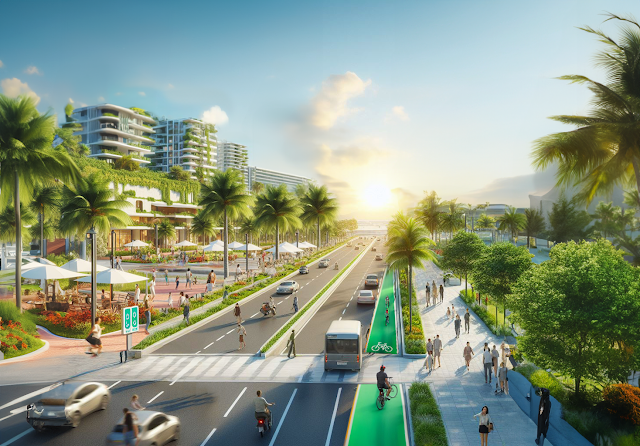 |
| An artist’s render of a 15-minute city, where work, food, housing, education and cultural activities are easily within reach. |
For the modern urban dweller, 15 minutes is a lot of time.
In just fifteen minutes, you can accomplish a lot of worthwhile tasks, like meditate, clear your email, jog a 1.5-kilometer route, perform high-intensity interval training (HITT), read the news, and make a smoothie.
However, 15 minutes is hardly enough time for a commuter in Metro Manila to get from point A to point B. You have probably not moved an inch in this time, especially during rush hour.
Have you heard of the 15-minute city? It's a modern urban planning concept that prioritizes people and the environment. The term was coined by Paris-based urbanist and Sorbonne University professor Carlos Moreno, who stated that the ideal neighborhood or city is built in such a way that work, food, housing, education, and cultural activities are all easily accessible within 15 minutes, whether by foot or bike.
 |
| An artist’s rendition of a soon-to-rise 15-minute city in Pasay |
This ensures lower transportation costs, lower carbon emissions, and, most importantly, healthier and happier people. No more long and tiring lines at the EDSA bus carousel, or sitting for hours in the middle of EDSA traffic.
The project has been thoughtfully planned and designed for many years, and the government has finally given it the green light to proceed. Indeed, Albay 2nd district Rep. Joey Salceda emphasized how the Pasay-led project is expected to generate billions in real estate assets for the government.
Revenues from the project will have a massive multiplier effect on our GDP and create an estimated 300,000 new jobs between 2027 and 2040. By 2035, it is expected to employ 4% of the National Capital Region's (NCR) total workforce.
The Pasay 360 Project aims to create a city that nurtures lives and livelihoods while also revitalizing the economy and grooming the next generation of Filipino leaders. It can be a source of pride for Filipinos as we approach the twenty-second century.

No comments:
Post a Comment